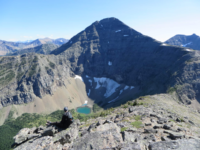Preserving Blackfoot ways
By Woodard, Dale on June 20, 2020.
Marcia Black Water was raised with a strong focus on cultural history
Dale Woodard
Lethbridge Herald
Marcia Black Water’s eduction in her Blackfoot ways go back as far as she can remember.
For the member of the Kainai First Nation -a part of the Blackfoot Confederacy that also includes the Piikani and Siksika First Nations – those earliest memories came from songs and stories shared by her mother, Delores (Aapaisaapiiaakii), the same songs and stories Delores’ grandmother Aahkiaapikkitstaakii (Annie Mountain Horse) shared with her.
Now the co-ordinator of Indigenous Services at Lethbridge College, Black Water carries her mother and grandmothers everywhere she goes.
“With our Indigenous women, they have a very important piece in that they are the holders of our knowledge. The men really play an important role in learning along with them, but having to protect that knowledge. They work together with that,” said Black Water. “The way I was raised, I really had a strong upbringing with my Blackfoot ways right from my mother’s grandmother, who actually raised her. She held a lot of knowledge. She was a traditional herbalist, so she knew all of the plants that were used for specific things. She carried that and just being involved in ceremonies, it was down through my grandmother to my mother and then our family. My aunts as well are really involved in our ways. So just having that background, I’ve been very fortunate to be able to walk as a Blackfoot woman strongly and never having a question of who I am. I think it has really built my strength as a person and that confidence of knowing who I am. I can do whatever it is I set my mind to. So it has really been a big part of who I am.”
The celebration continues with National Indigenous People’s Week, which began Monday with the raising of the Blackfoot Confederacy flag at city hall.
The week wraps up Sunday with National Indigenous People’s Day.
“I think it’s really good with everything here in Lethbridge,” said Black Water. “We have our Reconciliation Lethbridge committee that is quite dedicated to raising the knowledge and history of our Blackfoot people here in southern Alberta. We have a number that sit on that committee and we’re inspired by the thought and work that comes out of that committee.
“In Canada we do have quite a dark history with some of the relations we’ve had with non-Indigenous people right from colonization and I think this is an opportunity to share that truth with people and have it acknowledged and find ways that we can build better relationships and be better to each other.”
Black Water graduated from the General Studies program at Lethbridge College in 2004 and earned a Bachelor of Arts degree from the University of Lethbridge in 2009. She has been the co-ordinator of Indigenous Services at the college for the past six years.
“It’s been quite an opportunity and the people who I work with are just amazing with the work we get to accomplish together,” she said.
It’s a line of work that involves plenty of public speaking.
“We have so many prospective students coming in from high school in other groups, so we’re always having to stand up and speak on the fly,” said Black Water. “So I’ve gotten a lot better. But I think the opportunity I have seen in it, is to be able to share my story. My story is just one, but I think from it people can gain something in a way that a little part of my story might be part of theirs as well. So my voice can carry through to be that voice while maybe others are still trying to find theirs.”
In mid-September of 2017, Lethbridge College unveiled the Blackfoot Confederacy flag that will permanently fly at the campus.
“We always want to ensure that in everything we do we’re always giving recognition,” said Black Water. “We want to be more than just a territorial acknowledgment. When we use a territory we want to make sure people are learning who the Blackfoot people are, not just the past, but who are they today. So that resilience piece. Even though there’s that dark past and that dark history, we’re still here. We didn’t go anywhere and we are still thriving. Our communities are still thriving.”
21-20




